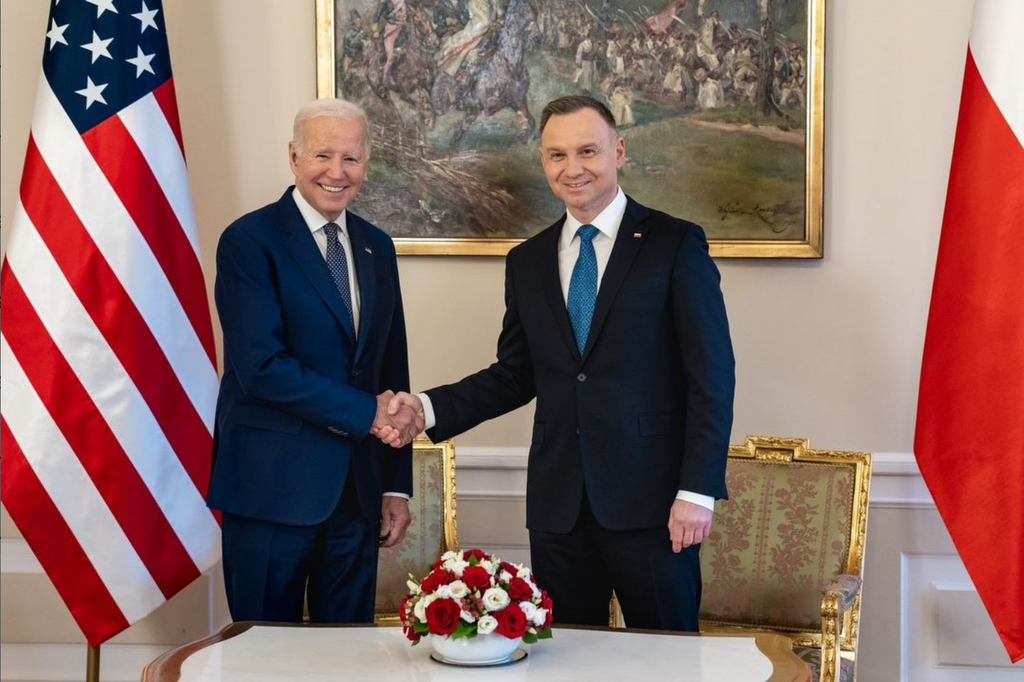Biden gibt Polen mit Bekenntnis zur NATO-Sicherheitsgarantie auch Stationierungszusage
Die Reden zunächst des russischen Präsidenten Wladimir Putin und von US-Präsident Joe Biden zu fast einem Jahr Ukraine-Krieg bestimmen am (heutigen) Dienstag die Nachrichten. Deshalb hier wenig dazu (Links zu den Texten unten), aber der Hinweis auf einen anderen Aspekt der Reise des US-Präsidenten: Polen, so scheint zunehmend die US-Sichtweise zu sein, gewinnt in Europa und in der NATO an Gewicht.
Dazu ein Ausschnitt aus den Bemerkungen Bidens nach seinem Treffen mit dem polnischen Präsidenten Andrzej Duda – und trotz des anekdotenhaften Tons, mit Geschichten vom jungen Joe Biden und Papst Johannes Paul, waren die politischen Aussagen klar:
The truth of the matter is: The United States needs Poland and NATO as much as NATO needs the United States, because there is no way in which — for our ability to operate anywhere else in the world, and our responsibilities extend beyond Europe, we have to have security in Europe. It’s that basic, that simple, that consequential.
And so, it’s the single-most consequential alliance, and I would argue maybe the most consequential alliance in history, that — not just modern history, but in history.
And — and so, I made it clear that the comments of the United States and our Allies as partner — the commitment is real and that, a year later, I would argue NATO is stronger than it’s ever been.
I — as I told President Zelenskyy when we spoke in Kyiv yesterday, I can proudly say that our support for Ukraine remains unwavering. (…)
And I want to thank you, President, for how Poland is supporting Ukraine. It’s been extraordinary, Mr. Prime Minister, what you’ve done. Truly extraordinary. (…)
And, you know, we — and we reaffirmed our — our ironclad commitment to NATO’s collective security, including guaranteeing that the command headquarters for — for our forces in Europe are going to be in Poland, period.
Die kollektive Sicherheitsgarantie der NATO und im selben Satz eine Stationierungszusage für Polen: Deutlicher konnte Biden kaum ausdrücken, wo für die USA der Schwerpunkt in Europa liegen dürfte. Vor dem Treffen der beiden Staatschefs und vor Bidens Rede in Warschau hatte der Sprecher des Nationalen Sicherheitsrats der USA, John Kirby, zwar das gemeinsame Engagement zur Unterstützung der Ukraine als wichtigstes Thema bezeichnet. Aber eben auch:
There are other issues, of course, that he will have the opportunity to talk to his Polish counterpart about. There is the larger question of NATO force posture and the continuing commitment of the United States to play a critical role in the defense of the eastern flank allies, including Poland.
And we have taken a number of steps over the course of the past year to bolster our defense posture here in Poland and along the eastern flank as part of a larger effort by NATO coming out of the Madrid Summit last year to strengthen defense and deterrence all along the eastern flank.
So, the President will have the opportunity to reinforce his fundamental message from last year that he intends to defend every inch of NATO territory and that he will do so not just with rhetoric but with the kinds of actions where we put in place necessary capabilities.
Die notwendigen Fähigkeiten dürften dann in Polen stationiert werden. Vermutlich nicht in dem Ausmaß, wie es Bidens Amtsvorgänger Donald Trump vorschwebte, der mit einer Verlagerung des US-Engagements nach Polen ganz bewusst Deutschland abstrafen wollte. Aber dennoch zeichnet sich möglicherweise eine Entwicklung ab, die auch Deutschland betreffen könnte – wenn auch die Drehscheibe Deutschland mit ihrer starken Präsenz des US-Militärs kaum Gefahr läuft, dass die US-Truppen abgezogen werden.
Zum Nachlesen noch die Reden der beiden Präsidenten:
Die Ansprache Bidens in Warschau
und
Die Rede Putins in Moskau (in der vom Kreml veröffentlichten englischen Fassung) und als Sicherheitskopie 20230221_Putin-Rede_Ukraine
(Foto: Biden, l., mit Polens Präsident Duda – Foto Weißes Haus)




@Dominik
Allerdings stelle ich fest, dass im westlichen Lager DEU durch den Krieg am staerksten negativ betroffen ist, nach der CoVid-19 Lage.
Vergleichen Sie z.B. die Wirtschaftszahlen 01/2020 zu 01/2023. Soziale Fragen treten hinzu.
@Thomas Melber:
Das mag so sein, liegt aber natürlich auch an der gewesenen, sehr einseitigen Ausrichtung der deutschen Wirtschaft und Versorgung auf billige russische Energie.